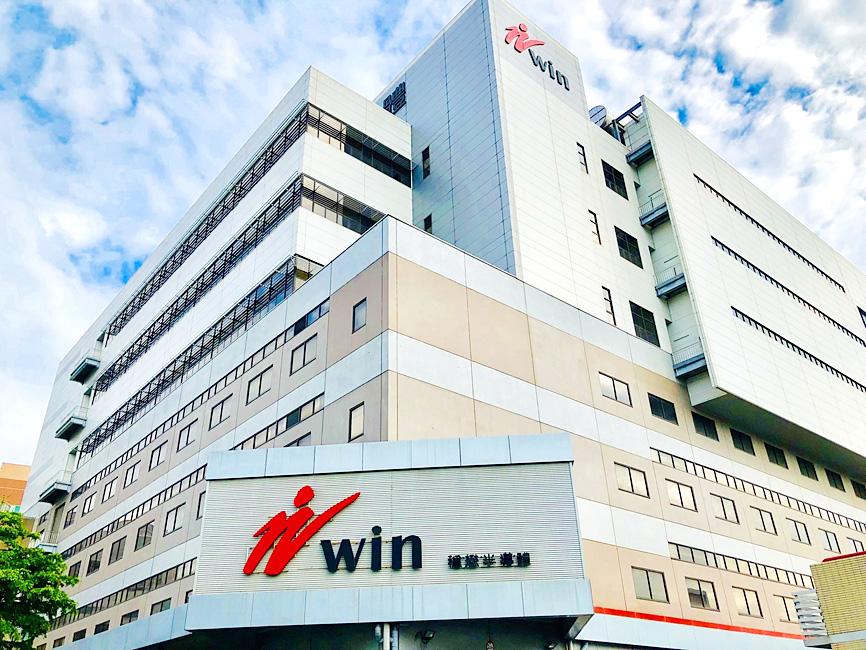Win Semiconductors Corp (穩懋半導體), the world’s largest pure-play gallium arsenide foundry, yesterday said that it is slowing capacity expansion this year as sluggish demand from Chinese smartphone chip designers is driving factory utilization to less than 70 percent this quarter.
The company plans to add 2,000 wafers per month to its plant in Taoyuan’s Gueishan District (龜山) by the end of this year, instead of 4,000 wafers as planned previously.
However, construction of a new factory in Kaohsiung’s Lujhu District (路竹) is to proceed as planned, as the new capacity aims to address longer-term demand in the next two to three years.

Photo: Screen grab from the Win Semiconductors Corp Web site
Besides, crucial semiconductor equipment delivery time has been stretched to between one year and one-and-a-half years since the outbreak of the COVID-19 pandemic, Win Semiconductors said.
“Chinese smartphone supply chains have entered an inventory correction period since the second half of the first quarter, which have had a severe impact” on suppliers, Win president Steven Chen (陳舜平) told investors on a conference call.
“As some of China’s major cities are under lockdown due to Beijing’s COVID-19 policy, it could continue to dampen consumer demand. Thus, we are conservative about how soon the inventory correction would be over. We do not have a clear picture about our customers’ situation,” Chen said.
“The correction is most marked among Chinese smartphone power amplifier chip designers,” he said.
Those customers account for 30 to 40 percent of the company’s smartphone power amplifier shipments, Chen said.
Reflecting dwindling demand, factory utilization is expected to slide further this quarter from 70 percent last quarter and 100 percent in the final quarter of last year, Win Semiconductors said.
Revenue this quarter is expected to dip to a high-single-digit percentage quarter-on-quarter from NT$6 billion in the first three months of this year due to weak cellular power amplifier demand, the company said.
Cellular power amplifiers accounted for about 50 percent of the company’s revenue last quarter.
Gross margin is forecast to drop to a multiyear low percentage in the high 20s or low 30s this quarter from 30.6 percent last quarter.
Despite the recent industrial turbulence, the company still holds an optimistic view about the mid to long-term business outlook, driven by 5G smartphones, 5G base stations, WiFi chips, 3D sensors and chips used in low-earth-orbit satellites, Chen said.
The company is maintaining its capital spending plan of NT$12 billion for this year, it said.
The firm’s first-quarter net profit declined 28 percent year-on-year to NT$786 million from NT$1.1 billion a year earlier.
On a quarterly basis, net profit plummeted 53 percent from NT$1.69 billion.
Earnings per share dipped to NT$2.08 last quarter, from NT$2.72 a year earlier and NT$4.19 in the previous quarter.
Gross margin tumbled to 30.6 percent last quarter from 33.5 percent a year earlier and 40.5 percent in the fourth quarter of last year, primarily due to lower factory utilization.

SELL-OFF: Investors expect tariff-driven volatility as the local boarse reopens today, while analysts say government support and solid fundamentals would steady sentiment Local investors are bracing for a sharp market downturn today as the nation’s financial markets resume trading following a two-day closure for national holidays before the weekend, with sentiment rattled by US President Donald Trump’s sweeping tariff announcement. Trump’s unveiling of new “reciprocal tariffs” on Wednesday triggered a sell-off in global markets, with the FTSE Taiwan Index Futures — a benchmark for Taiwanese equities traded in Singapore — tumbling 9.2 percent over the past two sessions. Meanwhile, the American depositary receipts (ADRs) of Taiwan Semiconductor Manufacturing Co (TSMC, 台積電), the most heavily weighted stock on the TAIEX, plunged 13.8 percent in

A wave of stop-loss selling and panic selling hit Taiwan's stock market at its opening today, with the weighted index plunging 2,086 points — a drop of more than 9.7 percent — marking the largest intraday point and percentage loss on record. The index bottomed out at 19,212.02, while futures were locked limit-down, with more than 1,000 stocks hitting their daily drop limit. Three heavyweight stocks — Taiwan Semiconductor Manufacturing Co (TSMC, 台積電), Hon Hai Precision Industry Co (Foxconn, 鴻海精密) and MediaTek (聯發科) — hit their limit-down prices as soon as the market opened, falling to NT$848 (US$25.54), NT$138.5 and NT$1,295 respectively. TSMC's

TARIFFS: The global ‘panic atmosphere remains strong,’ and foreign investors have continued to sell their holdings since the start of the year, the Ministry of Finance said The government yesterday authorized the activation of its NT$500 billion (US$15.15 billion) National Stabilization Fund (NSF) to prop up the local stock market after two days of sharp falls in reaction to US President Donald Trump’s new import tariffs. The Ministry of Finance said in a statement after the market close that the steering committee of the fund had been given the go-ahead to intervene in the market to bolster Taiwanese shares in a time of crisis. The fund has been authorized to use its assets “to carry out market stabilization tasks as appropriate to maintain the stability of Taiwan’s

In a small town in Paraguay, a showdown is brewing between traditional producers of yerba mate, a bitter herbal tea popular across South America, and miners of a shinier treasure: gold. A rush for the precious metal is pitting mate growers and indigenous groups against the expanding operations of small-scale miners who, until recently, were their neighbors, not nemeses. “They [the miners] have destroyed everything... The canals, springs, swamps,” said Vidal Britez, president of the Yerba Mate Producers’ Association of the town of Paso Yobai, about 210km east of capital Asuncion. “You can see the pollution from the dead fish.